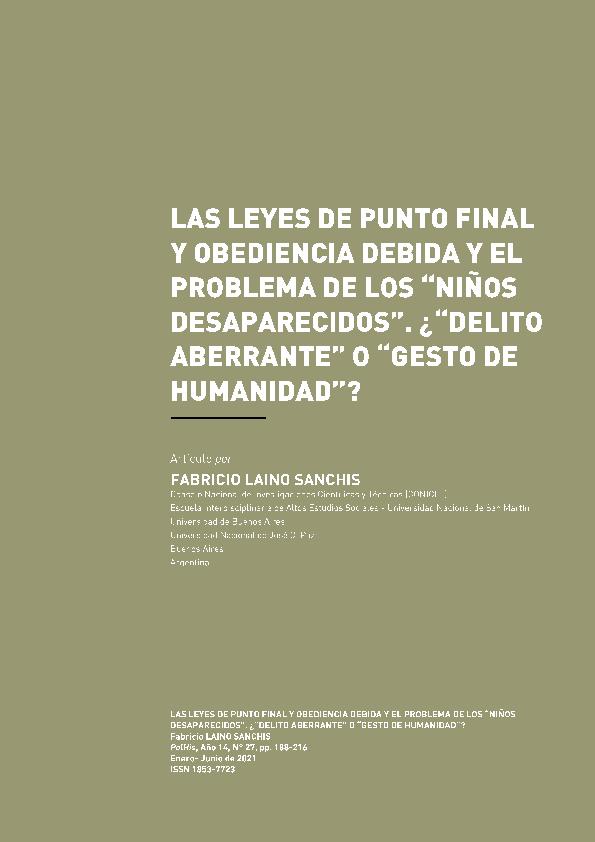Artículo
Las leyes de "Punto Final" (1986) y "Obediencia Debida" (1987) fueron los instrumentos con los que el gobierno de Raúl Alfonsín buscó clausurar el tratamiento judicial de los crímenes cometidos por las Fuerzas Armadas y de Seguridad durante la última dictadura en Argentina (1976-1983). Sin embargo, ambas leyes excluyeron de los beneficios de la extinción de la acción penal a la apropiación de niños y niñas ¿Por qué se produjo esta exclusión? ¿Qué lugar ocupó este delito en el debate de las leyes? A partir de estas preguntas, en este artículo analizamos ambos debates parlamentarios e indagamos en los argumentos políticos, legales y jurídicos utilizados para justificar o rechazar dicha exclusión. Analizamos también las representaciones sobre la cuestión de los "niños desaparecidos" que estas intervenciones pusieron de manifiesto. Al complementarlo con las diferentes reacciones públicas de Abuelas de Plaza de Mayo, este análisis nos mostrará también el repertorio de interacciones posibles entre los organismos de derechos humanos y el poder político en la temprana posdictadura. The Full Stop (1986) and the Due Obedience (1987) Acts were the instruments with which the Raúl Alfonsín administration sought to close the discussion of the crimes committed by the Armed and Security Forces during the last dictatorship in Argentina (1976‑1983). However, both acts excluded the crime of children appropriation from the benefits of applying the statutes of limitation. Why did this exclusion occur? What was the role of this crime in the discussion of these acts? This article analyzes parliamentary debates and explores the political and legal grounds used to justify or reject such exclusion. It also deals with the representations on the issue of the “niños desaparecidos” (“disappeared children”) that these interventions revealed. Complemented with the different public reactions of the Grandmothers of the Plaza de Mayo, this paper also shows the repertoire of interactions between human rights organizations and the political power in the early post-dictatorship period.
Las leyes de Punto Final y Obediencia Debida y el problema de los "niños desaparecidos": ¿"Delito aberrante" o "gesto de humanidad"?
Título:
The Full Stop and the Due Obedience acts and the issue of the “disappeared children”: An “aberrant crime” or a “gesture of humanity”?
Fecha de publicación:
12/2021
Editorial:
Programa Interuniversitario de Historia Política
Revista:
PolHis
ISSN:
1853-7723
Idioma:
Español
Tipo de recurso:
Artículo publicado
Clasificación temática:
Resumen
Archivos asociados
Licencia
Identificadores
Colecciones
Articulos(SEDE CENTRAL)
Articulos de SEDE CENTRAL
Articulos de SEDE CENTRAL
Citación
Laino Sanchís, Fabricio Andrés; Las leyes de Punto Final y Obediencia Debida y el problema de los "niños desaparecidos": ¿"Delito aberrante" o "gesto de humanidad"?; Programa Interuniversitario de Historia Política; PolHis; 14; 27; 12-2021; 188-216
Compartir




